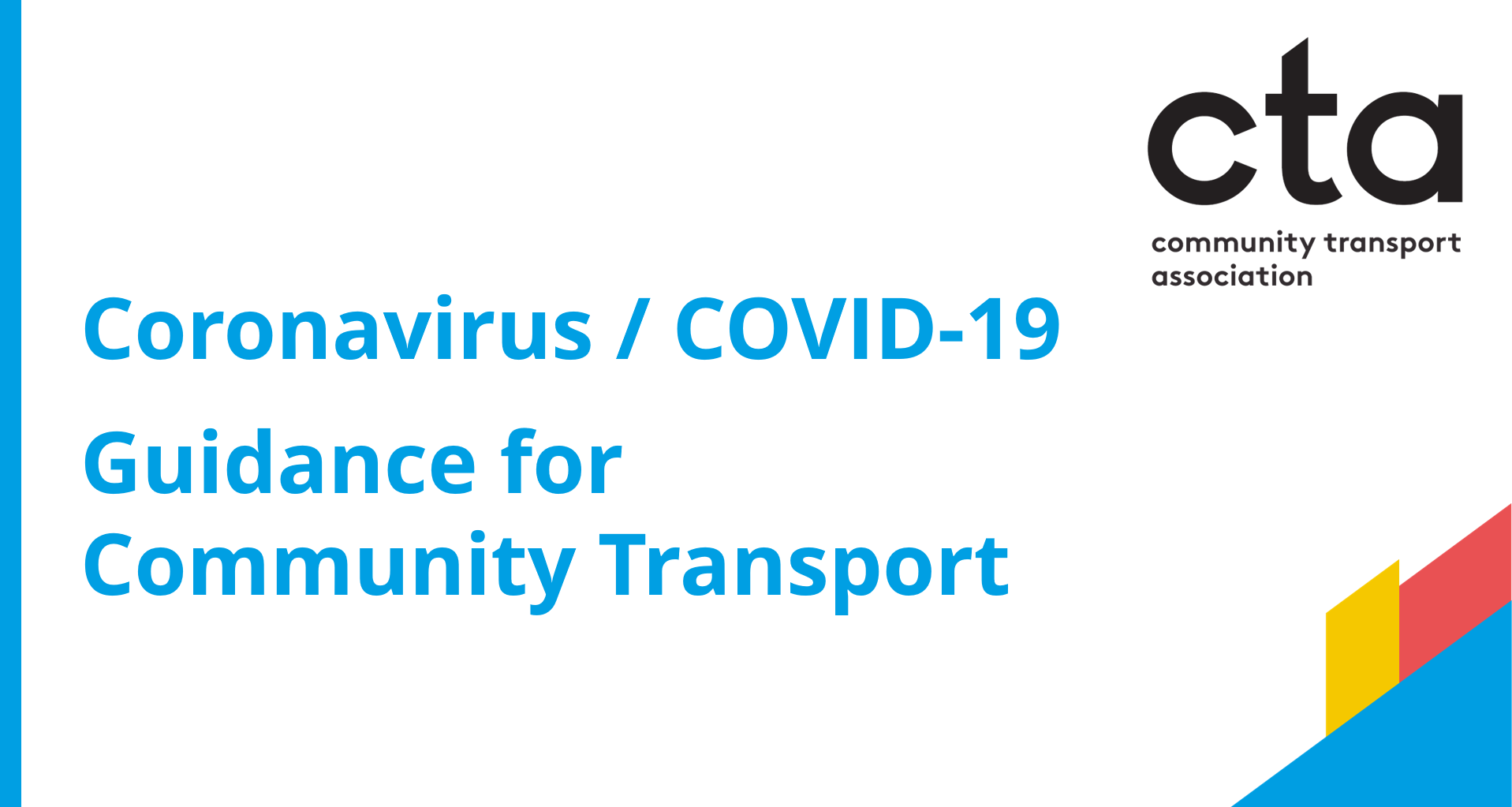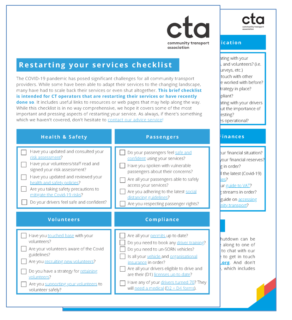-

Coronavirus/COVID-19: Guidance for Community Transport
-
20th June 2022
-
As the Covid-19 pandemic shifts into a new phase, the UK is beginning to explore what ‘endemic’ Covid means for everyone. Governments across the country are trying to understand what living with this disease means for our citizens, in terms of ongoing protections, restrictions, testing and tracing transmission.
For the Community Transport sector, who have responded rapidly at every stage of the pandemic with care and a community focus, there is a balance to be struck in ensuring passengers are supported to travel safely and connect with their communities. While legislation and guidance may change, the need to protect the safety and wellbeing of staff, volunteers and passengers remains of the highest priority.
At CTA we recognise that this changing legal landscape may create further uncertainty for CT operators. As ever, local restrictions must be considered in the context of your own operation, staff, volunteers, and passengers, and consider your risk assessments so you can make a clear decision about what services you run and how you run them. Ultimately, it is up to you, in line with the restrictions where you are, to decide what measures you put in place to deliver your services safely.
COVID-19 remains a risk
COVID-19 will be a feature of our lives for the foreseeable future, so we need to learn to live with it and manage the risk to ourselves and others.
Understanding the risks of COVID-19
In general, the risk of catching or passing on COVID-19 is higher in crowded and enclosed spaces, where there are more people who might be infectious and limited fresh air. There are still cases of COVID-19 in circulation and there is a risk you could catch or pass on the virus, even once you are fully vaccinated.
Let fresh air in if you meet indoors. Meeting outdoors is safer
Meeting outdoors vastly reduces the risk of airborne transmission, but this may not always be possible. If you’re indoors (including in a vehicle), you should let fresh air in to reduce the risk of catching or spreading COVID-19.
Wear a face covering
Whilst there is no longer a legal requirement to wear a face covering in any of the UK’s nations, the Government suggests that you continue to wear one in crowded and enclosed spaces, especially where you come into contact with people you do not usually meet.
What information are you looking for?
At CTA, we’re here to help – below you can find the official guidance in England, Scotland, Wales and Northern Ireland, as well as other useful resources. As it has been throughout the pandemic, our Advice Service is also available for CTA members, so if there’s any information you need that we haven’t provided, or if you would like to talk through your organisation’s best course of action, please do get in touch with our team via advice@ctauk.org.
You can use the links below to jump to the specific information that you’re looking for.
- The Latest Guidance in England, Wales, Scotland and Northern Ireland
- Guidance on Vaccinations
- Resources on risk assessment and risk management
- Our checklist for restarting services
- Resources and funding programmes in response to coronavirus
- Contact the CTA Advice Service.
The Latest Guidance in England
- UK Government’s main guidance page
- UK Government’s guidance for people experiencing symptoms of Covid-19
- UK Government’s guidance on reducing the spread of respiratory infections
The Latest Guidance in Wales
The Latest Guidance in Scotland
- Scottish Government’s main guidance page
- Scottish Government’s guidance on living safely with Covid-19
- Transport Scotland’s updates and news on Covid-19
The Latest Guidance in Northern Ireland
- NI Executive main guidance page
- NI Executive guidance for transport operators
- NI Executive guidance for passengers
- NI Executive guidance on car sharing
Other Resources and Guidance
Vaccinations
With the COVID-19 vaccination programme now fully rolled out across the country, many community transport providers are getting involved with making sure that members of their community can access both doses of the vaccine and boosters. There are also questions about volunteers and members of staff getting vaccinated, as well as what implications passenger numbers have on vehicle capacity.
For all our guidance on vaccinations, click here.
Risk Assessment and Risk Management

When you make any decision about managing risk on your services, it’s important to make sure that you have a comprehensive risk assessment in place. With the support of CTA members from across the UK, CTA produced community transport specific templates and resources relating to COVID-19 risk assessments which CTA members can download from ctauk.org/advice-resources/risk-assessment-and-management.
If you’re not a CTA member, you can still download our ‘How To’ guide for risk assessments, as well as a COVID-19 specific risk assessment template below.
Download our risk assessment ‘how to’ guide here
Download our COVID-19 specific risk assessment template here
Restarting Services

The COVID-19 pandemic has posed significant challenges for all community transport providers. While some have been able to adapt their services to the changing landscape, many have had to scale back their services or even shut altogether. We’ve put together a checklist intended for community transport operators that are restarting their services or have recently done so.
Download our restarting your services checklist here.
Funding Resources
Funding is more important than ever for community transport providers as we continue to recover from Covid-19 and restart services. This page contains links to a number of different sources of funding and information. Given the uncertain situation that we are still in, many funders are continuing to adapt their priorities and funding programmes to respond to the emerging needs of communities. Before committing your time and effort to apply to a particular fund, you will need to carefully check the eligibility criteria, funding aims and if there are any deadlines.
Go to our information on funding resources
Leave a reply
13 Comments
-


Malpas Community Minibus Association
Thank you. It was encouraging to be able to note that the actions we are taking to transport those without their own transport for their vaccinbes, is taking place according to CTA guidelines.
Robin heath
Would detol help to disinfect surfaces in my taxi?
Or perhaps bleach in water?
CS
Do you think it is still appropriate to charge for these services as a volunteer community scheme or should volunteer drivers be reimbursed via SCC subsidy instead?
Julia Howell
Dear CTA
Most of our drivers are 70+ and will soon have to make decisions on continuing. All our community hires have been cancelled and the majority of passengers are the ‘at risk’ group. We now have no income to pay our staff member. We would like some advice please.
stuart needham
All the MiDAS Training I have scheduled for the next 3 months has been cancelled so no income/cash flow -my concern is, as a small training charity, of not knowing if we will be entitled to the £10,000 small business grant? if we are, then how soon can we receive it? what is the criteria to claim the grant? how do we actually get it awarded? – especially as our local council has sent out some info about how they are not generating normal revenues, and their income streams are being affected e.g. reduced car parking revenue, reduced room hire revenue etc. – the worry is that they will ‘top-slice’ any bulk of grant monies cascaded down from the government for their own needs before seeking out the small businesses to disseminate it to
and I am self isolating but I’m eager to know if I’ve actually had the virus – I have demonstrated most symptoms except a temperature – I need some sort of testing – because if I have had it and will subsequently recover, then eventually I could volunteer my services (and use of our minibus), but if I’ve not actually had it then I don’t want to be out there and catch it, or put others at risk if I still have it
things are just not clear
Nigel Hinch
Demand has dropped to a level that we are consolidating routes into two day’s.
Day centres closed, retirement villages and care homes preventing visitors. Families telling elderly parents not to go on the bus
Vee Robinson-Caffrey
All of our groups have now cancelled.
Our car scheme has been severely depleted.
Our school contracts are affected along with everyone else and the local authority has said that at present they class this as a “force majeure” meaning no payments. However, when the crisis is over they will need vehicles and staff in place to continue the contracts. I’m pleased the stance the CTA are taking in regard to this, we will be contacting our MP too.
Jill Bayliss, GorranBus
We have consolidated our three Truro services to two, and two St. Austell services into one. This gives us some free time to help with collecting groceries etc.
We have cancelled all planned excursions and will keep our monthly Plymouth service under review.
Lincoln Area Dial a Ride Ltd
Many of our luncheon groups have cancelled.
Bruce Horne - Henley HandyBus
Thank you for above advice and regular updated comments
Very useful
G S Hawley
Thank you for your email
Jonathan Barstow
Two care homes that use our minibus have now cancelled bookings as they are no longer making trips out, due to the Covid19 virus.
John Humphries
I much appreciate your guidance here. Some of our clients have already cancelled and advice on how to clean our vehicle is very useful.